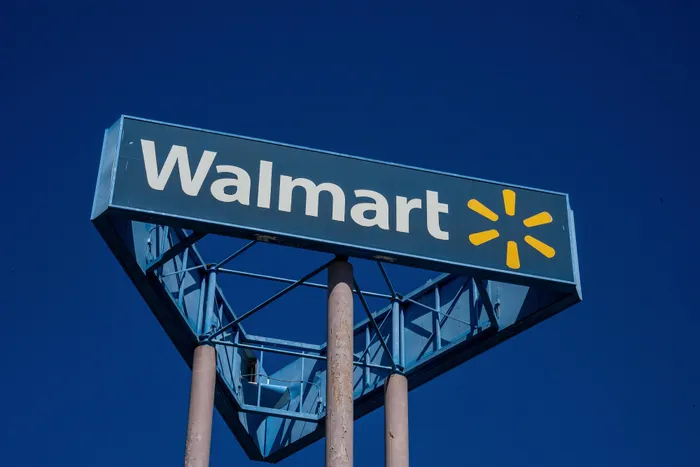
Signage at a Walmart store in San Leandro, California, US.
Image: David Paul Morris/Bloomberg
Walmart wants another shot at cracking the Africa market. This time, it’s staking its name on it.
About 15 years after the world’s largest retailer got a foothold on the continent with the purchase of a controlling stake in South Africa’s top food and household goods seller Massmart, its failure to gain ground is prompting a change in approach. The company - which sells everything from fashion and fishing rods to frozen peas and prescription medicines - is opening its first Walmart branded stores in the country this year in what could become a model for a continent with the planet’s fastest-growing population.
The retailer, which has had success with branded stores in emerging markets like Mexico and China, is banking on its famed low prices to lure cost-conscious shoppers in the intensely competitive South African market. Many shoppers in the country know the Walmart name and expect the new stores to offer cheaper, good quality products.
“South Africans are shoppers,” said Babitha Ramnarain, who works at a law firm in Johannesburg’s financial district of Sandton, across from one of Africa’s largest shopping malls. “Everyone here is looking for a bargain. So switching to Walmart will depend on price.”
With the push, Walmart is deviating from its international strategy of exiting low-growth markets. The US retailer is sticking with South Africa in spite of losses and a sliding market share in the country where it has so far invested at least 23 billion rand ($1.3 billion). Walmart said it believes in the potential of the market.
Opening its own stores will enable Walmart to focus on low prices and offer global brands, while still partnering with South African suppliers and entrepreneurs, according to Kathryn McLay, chief executive officer of Walmart International. The company declined to provide more details on its plans.
“Until now, they’ve carried too many brands, resulting in a lack of synergy,” said Evan Walker, a manager at 36ONE Asset Management in Cape Town. “By testing Walmart’s brand recognition in a handful of stores, they can then decide whether to pull the existing Massmart brands under the Walmart brand and try resurrect a new business off the back of that.”
Walmart’s current push in South Africa comes at a time when the country’s relations with the US are at a low point after President Donald Trump accused it of “white genocide,” a claim the government strongly denies. The company’s first effort in 2010 to enter the South African market was also a controversial one, with its Massmart deal seen as a test case of the country’s willingness to allow unimpeded foreign investment. Walmart took full control of Massmart three years ago and has since been trying to arrest a slump in profit.
Online Growth
Having operated in South Africa for several years, “Walmart’s learned some valuable lessons about the local market,” said Alec Abraham, an analyst at Sasfin Securities in Johannesburg.
It has faced formidable domestic rivals like Shoprite Holdings Ltd. alongside hundreds of mom-and-pop style retail outlets that appeal to shoppers because of their locations near transport hubs and in sprawling townships. Additionally, it has had to operate on a continent where local economies are regularly weakened by splintered politics.
But Walmart has experience in emerging markets. In some, like South Korea and Brazil, it’s gone in big and failed. Others, like India and Mexico, it has adapted and succeeded. The best outcomes have been where, as Chief Executive Officer Doug McMillon says, Walmart strives to be the most local of global companies - where it brings its sourcing might, but molds itself to local tastes and habits.
For Ya’eesh Patel, an analyst with SBG Securities in Johannesburg, Walmart’s decision to beef up its presence rather than walk away is no mystery - the new strategy is likely to be aimed at offering lower prices, more food and expanding online, he said.
The country’s online retail sector is growing at an annualized rate of 38% this year to about 130 billion rand and will capture 10% of the market, after growing 35% last year, according to the Online Retail in South Africa 2025 report.
Cape Town-based Shoprite, Africa’s largest grocer, recently reported online grocery growth of 48% to about $1.1 billion with its Sixty60 one-hour grocery delivery app that is now offered at about 700 outlets across the country. Competition in the market has been further heightened with Amazon and Chinese giant Shein trying to win customers.
Walmart may expand cautiously, using the few stores it initially opens to test its brand resonance, Patel said. If successful, it may then convert Massmart’s long-struggling Game stores to own-branded outlets that could also act as distribution centers for online sales, potentially targeting an integrated ecommerce strategy across its brands, he said. A multichannel retail approach has been the source of much of Walmart’s success in several countries.
“South African retailers need to be worried, because as much as Walmart will likely lose money at first, there’s no doubt that cash is available to roll it out well and to give it a good shot,” said Syd Vianello, an independent retail analyst in Johannesburg.
BLOOMBERG